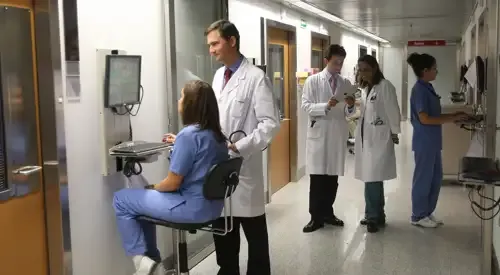Reactive arthritis
"The goal of treatment is to control the inflammation in order to decrease patients' symptoms and disability, preventing permanent damage to the joints".
DR. ENRIQUE ORNILLA
SPECIALIST. RHEUMATOLOGY SERVICE

Reactive arthritis is a type of spondyloarthropathy, due to the immune response triggered by a bacterial infection, mainly located in the gastrointestinal and urogenital tract. It occurs most frequently in patients who have the genetic marker HLA B27.
The association of arthritis, non-gonococcal urethritis and conjunctivitis was described in 1916 and was called Reiter's syndrome. Today, this syndrome is considered a clinical form of reactive arthritis.

What are the symptoms of reactive arthritis?
Clinically, affected patients can present moderate fever, asymmetric arthritis of predominance in lower limbs, urethritis (urethral inflammation) and conjunctivitis (in later phases uveitis - ocular affectation- occurs).
Also they present entesopatía (inflammation), mainly in feet, pain in region gluteus (by inflammation of the articulations sacro-ilíacas) and, in the chronic forms, usually the spine with limitation of its mobility is affected clearly.
The cutaneous injuries are frequent, mainly, in plants, palms and subungual region and are denominated queratodermia blenorrágica. At the level of mucous membranes, they can present ulcers in the mouth and at the level of the penis (circulating balanitis).
The most common symptoms are:
- Fever
- Urethral inflammation
- Conjunctivitis
- Enthesopathy
- Skin lesions
Other less frequent manifestations are cardiovascular, peripheral nerve and pulmonary involvement.
Do you have any of these symptoms?
You may have reactive arthritis
What are the causes of reactive arthritis?
The exact cause of reactive arthritis is not known. Very commonly, this syndrome occurs in men before the age of 40 and can develop after infection with Chlamydia, Campylobacter, Salmonella or Yersinia.
Also, certain genes can make one more prone to develop this pathology.
This disorder is rare in young children, but can occur in adolescents.
How is reactive arthritis diagnosed?

There is no single test that helps diagnose reactive arthritis. Since it is an illness triggered by a bacterial infection, it is necessary to identify the germ that causes it, although this will not always be possible. For this, cultures of the urethra, pharynx, urine, feces, etc. must be taken.
Serologies for certain bacteria and viruses will also be of great help. But, most of the results will be negative.
In the analysis, may be increased sedimentation rate (SVG) and C-reactive protein (PCR). The rheumatoid factor is negative.
Radiology can reveal everything from increased soft tissue to erosions and impingement of the joint interline. But sometimes it is indistinguishable from ankylosing spondylitis.
How are reactive arthritis treated?
The treatment and monitoring of this disease is carried out in a joint and multidisciplinary way with other services.
The treatment is done with non-steroidal anti-inflammatory drugs to reduce pain and/or inflammation. If a germ in the urethral secretion or in the feces is demonstrated by means of cultures, an antibiotic treatment will also be carried out. The ocular and dermatological affectation will require a specific treatment.
Concomitant physiotherapy for joint and spinal affectation is important in order to maintain the best possible mobility.
In specific cases, treatment with immunosuppressive drugs (methotrexate, salazopyrine, anti-TNF) is required.
The Rheumatology Service
of the Clínica Universidad de Navarra
The Rheumatology Service has a multidisciplinary team highly specialized in the diagnosis and treatment of rheumatological diseases, from osteoarthritis, arthritis or osteoporosis to autoimmune or inflammatory diseases.
In addition, we have doctors specialized in assisting pregnant women with autoimmune diseases, in order to guarantee the maximum safety of the fetus.
Organized in specialized units
- Inflammatory arthropathies.
- Degenerative arthropathies.
- Microcrystalline arthropathies.
- Bone pathology.
- Systemic autoimmune diseases.
- Autoinflammatory diseases.

Why at the Clinica?
- Valoración integral del paciente.
- Diagnóstico personalizado.
- Tecnología de vanguardia.



